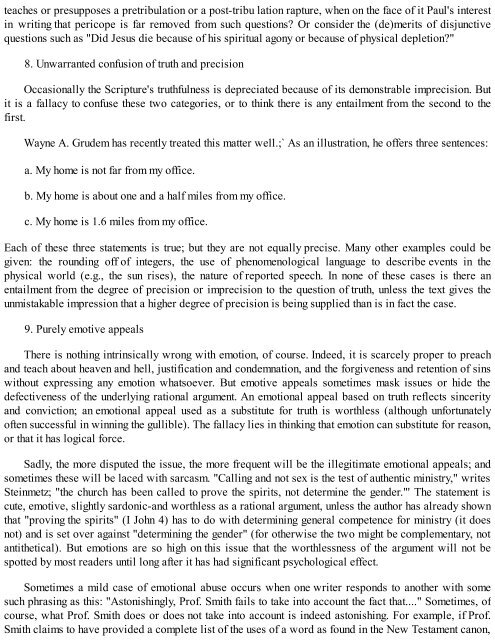Exegetical Fallacies - D. A. Carson
Exegetical Fallacies - D. A. Carson
Exegetical Fallacies - D. A. Carson
You also want an ePaper? Increase the reach of your titles
YUMPU automatically turns print PDFs into web optimized ePapers that Google loves.
teaches or presupposes a pretribulation or a post-tribu lation rapture, when on the face of it Paul's interest<br />
in writing that pericope is far removed from such questions? Or consider the (de)merits of disjunctive<br />
questions such as "Did Jesus die because of his spiritual agony or because of physical depletion?"<br />
8. Unwarranted confusion of truth and precision<br />
Occasionally the Scripture's truthfulness is depreciated because of its demonstrable imprecision. But<br />
it is a fallacy to confuse these two categories, or to think there is any entailment from the second to the<br />
first.<br />
Wayne A. Grudem has recently treated this matter well.;` As an illustration, he offers three sentences:<br />
a. My home is not far from my office.<br />
b. My home is about one and a half miles from my office.<br />
c. My home is 1.6 miles from my office.<br />
Each of these three statements is true; but they are not equally precise. Many other examples could be<br />
given: the rounding off of integers, the use of phenomenological language to describe events in the<br />
physical world (e.g., the sun rises), the nature of reported speech. In none of these cases is there an<br />
entailment from the degree of precision or imprecision to the question of truth, unless the text gives the<br />
unmistakable impression that a higher degree of precision is being supplied than is in fact the case.<br />
9. Purely emotive appeals<br />
There is nothing intrinsically wrong with emotion, of course. Indeed, it is scarcely proper to preach<br />
and teach about heaven and hell, justification and condemnation, and the forgiveness and retention of sins<br />
without expressing any emotion whatsoever. But emotive appeals sometimes mask issues or hide the<br />
defectiveness of the underlying rational argument. An emotional appeal based on truth reflects sincerity<br />
and conviction; an emotional appeal used as a substitute for truth is worthless (although unfortunately<br />
often successful in winning the gullible). The fallacy lies in thinking that emotion can substitute for reason,<br />
or that it has logical force.<br />
Sadly, the more disputed the issue, the more frequent will be the illegitimate emotional appeals; and<br />
sometimes these will be laced with sarcasm. "Calling and not sex is the test of authentic ministry," writes<br />
Steinmetz; "the church has been called to prove the spirits, not determine the gender."' The statement is<br />
cute, emotive, slightly sardonic-and worthless as a rational argument, unless the author has already shown<br />
that "proving the spirits" (I John 4) has to do with determining general competence for ministry (it does<br />
not) and is set over against "determining the gender" (for otherwise the two might be complementary, not<br />
antithetical). But emotions are so high on this issue that the worthlessness of the argument will not be<br />
spotted by most readers until long after it has had significant psychological effect.<br />
Sometimes a mild case of emotional abuse occurs when one writer responds to another with some<br />
such phrasing as this: "Astonishingly, Prof. Smith fails to take into account the fact that...." Sometimes, of<br />
course, what Prof. Smith does or does not take into account is indeed astonishing. For example, if Prof.<br />
Smith claims to have provided a complete list of the uses of a word as found in the New Testament canon,



